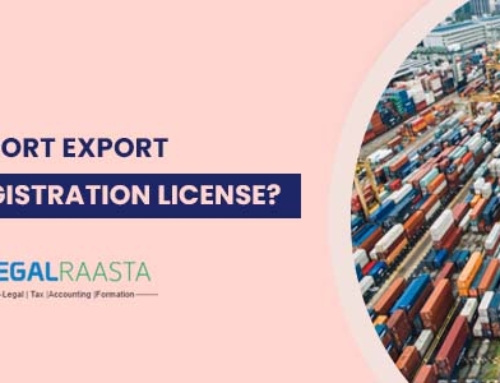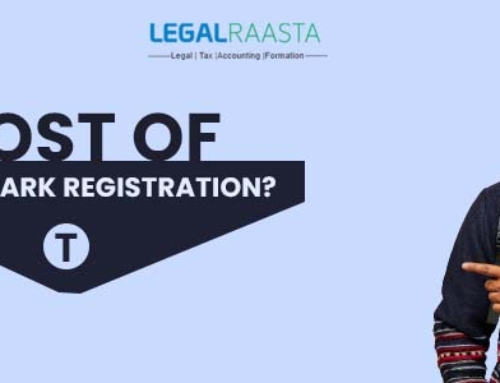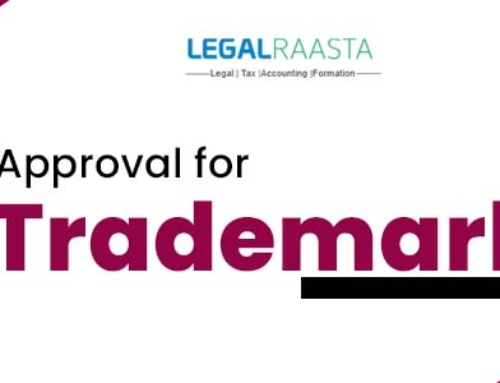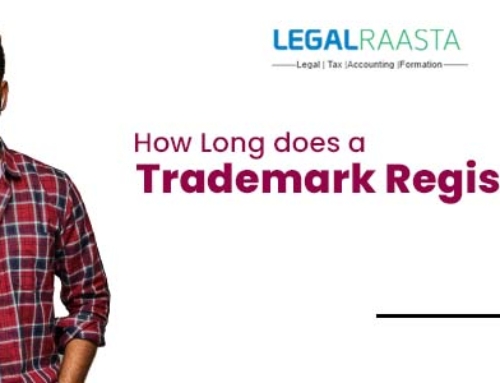A trademark allows you to prevent others from using your company as a prop and protects your brand. A trademark is anything you use to distinguish your products from those of competitors, such as words, colours, logos, object shapes, sounds, and three-dimensional designs. A trademark provides a distinct identity to a service, product, or company. Furthermore, when the benefits to a company or brand are considered, the fees or cost of trademark registration is extremely low. Many people are hesitant to register their trademark because they are concerned about the cost, even though doing so would help protect their company’s long-term reputation. The cost of trademark registration is broken down, making the total amount appear less incredibly high.
The breakdown of the trademark registration cost makes the overall amount, which may appear to be a little high, more reasonable. Before we get into the Cost of Registering a Trademark in India, we’ll show you in this blog how the LegalRaasta team can help you with the fundamentals.

What is a Trademark Registration?
Contents
A trademark is anything you use to distinguish your products from those of competitors, such as words, colours, logos, object shapes, sounds, and three-dimensional designs. A trademark provides a distinct identity to a service, product, or company. They stand out from the crowd because of their distinct identity. The Trade Marks Act of 1999 established the legal process of trademark registration. Registering a trademark, also known as logo registration or brand registration, protects your brand or logo and prevents others from using it.
Registering a trademark grants you ownership of the logo, name, or brand. A company or individual must go through the trademark registration process in India to protect their logo from third-party infringement. When a trademark is registered, the owner gains the exclusive right to use the mark in connection with its products or services. Indian trademark registration is required for companies and individuals to protect their logos from third parties. When a trademark is registered, the owner acquires the exclusive right to use the mark in association with its products or services.
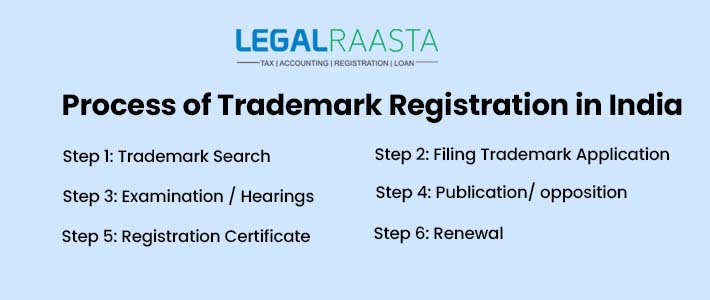
Process of Trademark registration in India
Step 1: Trademark Search
You can use your Trademark (TM) symbol next to your brand name once you receive your declaration. A trademark needs to be properly chosen or made because it cannot be altered. When choosing a trademark, check to verify if it is distinctive by running a trademark search. If another party has already registered a trademark that is close to or identical to yours, you must amend or modify yours before continuing.
Step 2: Filing Trademark Application.
If the form is submitted electronically, the acknowledgement can be obtained right away including a copy of a trademark, a claim proof, and a power of attorney, must be submitted with the application. The Trademark symbol (TM) may now be used following acknowledgment.
Step 3: Examination / Hearings
The Controller General of Patents, Designs, and Trademarks establishes rules and guidelines, which the Trademark Officer verifies in the application and assesses if the case complies with. A trademark objection notice will be sent if the trademark officer finds any issues or needs more details. If the officer is pleased with the reply, the trademark will be published in a journal. If not, they will set up a hearing where you will have to represent yourself using a trademark lawyer.
Step 4: Publication/ opposition
Your registered trademark will be published in the Indian Trademark Journal by the Registrar after the examination procedure is finished. Generally speaking, an opposition must be submitted within 90 or, in some circumstances, 120 days following the date of publication. Any natural or legal person may oppose on the Registry.
Step 5: Registration Certificate
As soon as you issue your certificate, the registered trademark sign may be used in conjunction with your brand name. The R sign may now be used next to your company name. You will receive a form acknowledgement within 15–20 days.
Step 6: Renewal
You can do this six months before the date of expiration. Your trademark rights will now be protected for an additional ten years thanks to the renewal.

Here are the documents you will need to provide us with in order to register your trademark:
- The applicant’s information, the proprietor’s identification (PAN card, Aadhar card, and other documents), and the proprietor’s identity (name, address, and nationality) may be submitted when applying for a sole proprietorship business.
- Businesses must provide proof of address, which is the registration address.
- The nature, goal, and location of your business, as well as the name of your brand/logo/slogan.
- A signed Form-48 is being used, which must be submitted.
- Business verification Depending on the type of business, businesses must provide proof of address.
- MSME, COI, and, if the business is a partnership firm, a partnership deed or Udyog Aadhar in the case of a corporation, small business, startup, or other entity.

Registration Costs for Trademarks
A trademark may be owned by any person, company, or organization. Numerous businesses also submit trademark applications for goods packaging or the actual product due to the fierce competition and ongoing digitalization. Once the aforementioned steps have been properly completed, filing the application might be one of the simplest. It is comparable to laying the foundation for your home before you begin construction. To avoid later objections from the trademark office, which is something that comes with experience, it is crucial to include the correct information in your application. The officials will collect fees for each category and there will be separate fees for some elements, such as a collection of marks and linked symbols.
Trademark Registration Fees: Government fees for trademark registration in India are Rs. 4,500 per application per class for individuals, private limited company, startups, and small businesses or MSME and Rs. 9,000 per application per class for everyone else like which fall under category others i.e. partnership or joint application. LegalRaasta professional fees are as per client requirement per application per class with a timeline of 1 day and registration can be completed in 6 months if the trademark is distinctive.
Trademark Objection Fees: When examining your application to register your trademark, the trademark office may raise objections. These objections must be addressed and complied with within one to two months of the date on which they were raised. When the same is anticipated by your service provider during the classification and trademark search, the majority of these objections can be avoided. This not only reduces the cost of registering a trademark in India, but it also expedites the process. Professional fees are determined by the client per application, trademark, and class, and there are no official fees. The application processing time is 1.5 to 2 years from the date of filing.
Trademark Renewal Fees: In India, a trademark renewal can be requested six months before it expires. Your trademark rights are protected for an additional 10 years thanks to the renewal. Our LegalRaasta Professional fees are as per client requirement per application per trademark per class and official fees are Rs. 9000 per class.
Conclusion
The intellectual property rights in trademarks are created when a brand wants to set itself apart from competitors and give its products a unique identity. A company or individual can obtain a registered mark and protect their brand from market infringement by following the steps and paying the fees involved in trademark registration, which are covered above in the article. The above steps assist the company in registering its trademark and protecting it from legal violations.
Anyone who uses a trademark without permission is subject to legal action from the trademark owner. You can get a good idea of the overall cost of registering a trademark in India from the above-mentioned trademark registration fees. Despite the fact that the cost of trademark registration in India may vary slightly depending on how many trademark classes you are filing your trademark under, registering your trademark has the advantage of preserving the reputation of your company. You can get assistance with this from the LegalRaasta team. In order to ensure a trouble-free registration process, it is also always preferable to use professional trademark services.


